Decentralization of state budget management in Quang Ninh province
According to Vietnam’s Law on
State Budget (2005), State budget means
all the expenditures and revenues that
are estimated and realized over a certain
period of time decided by competent
authorities in order to perform the
functions and tasks of the State.
Local state budgets means state
budget revenues that a local government
may use, additional funding from
central government budget to the local
government budget, and state budget
expenditures within the liabilities of
the local government. Decentralization
of budget management means the
determination of scope, responsibility,
and entitlements of various levels of
authorities and budget estimate units to
state budget management that suit socioeconomic management decentralization.
The nature of local government budget
is the relationship of economic benefits
between local governments and central
governments, between local governments
and other entities such as organizations,
businesses, households and individuals
inside and outside the country and local
governments at all levels in the process of
creating, distributing and using the local
state budget. The decentralization of state
budget management is essentially solving
the relationship between central and local
governments in three areas
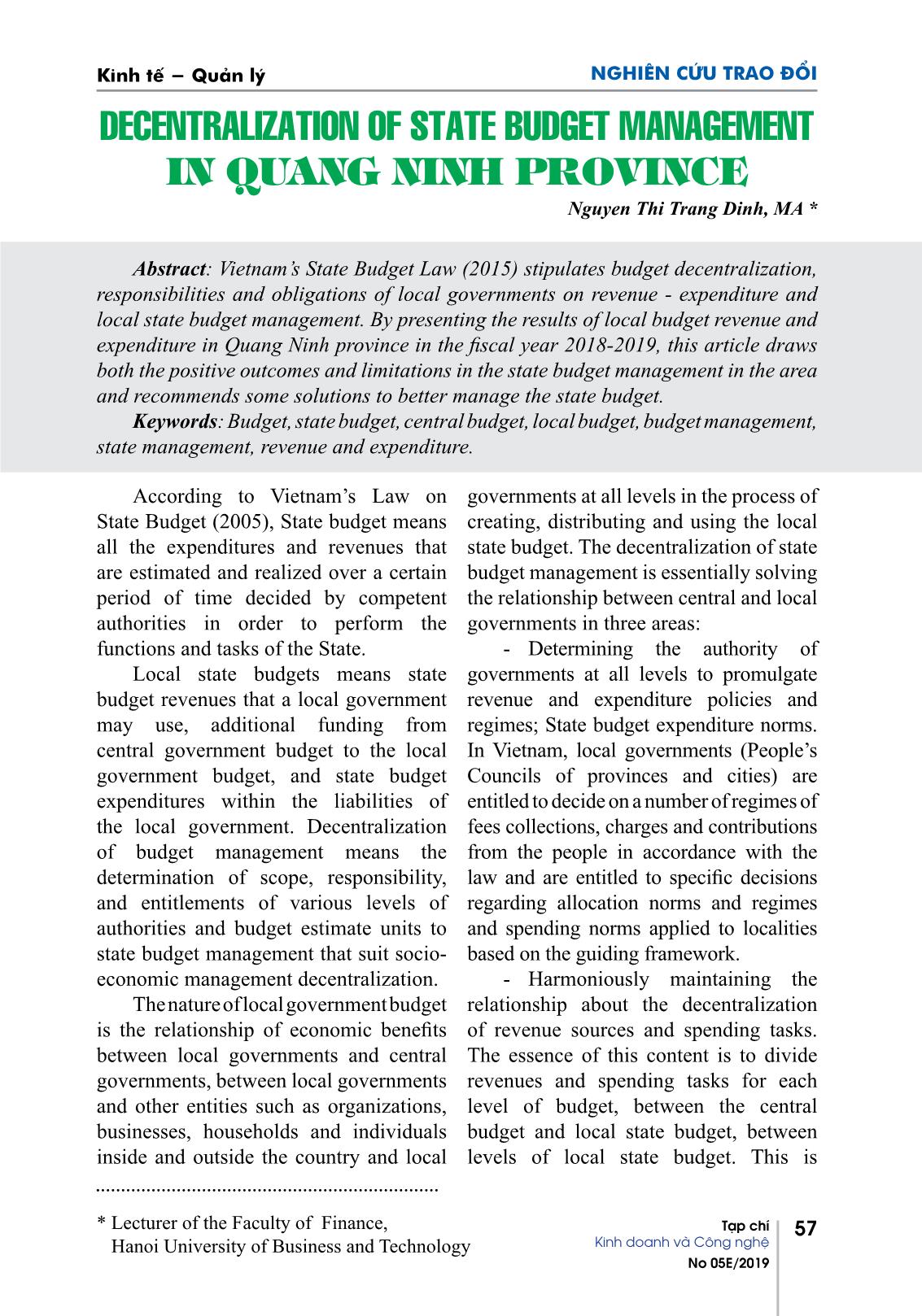
Trang 1
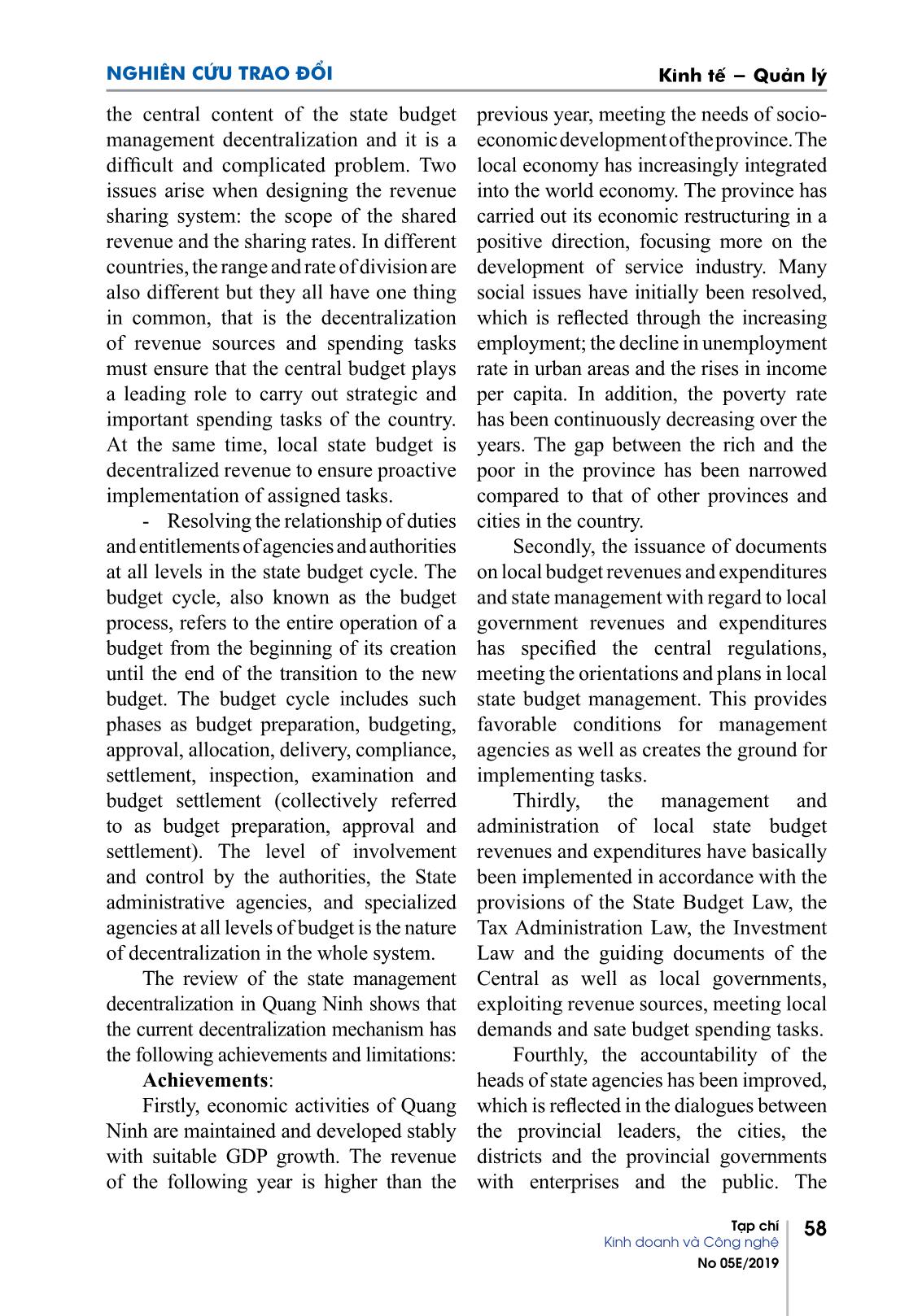
Trang 2
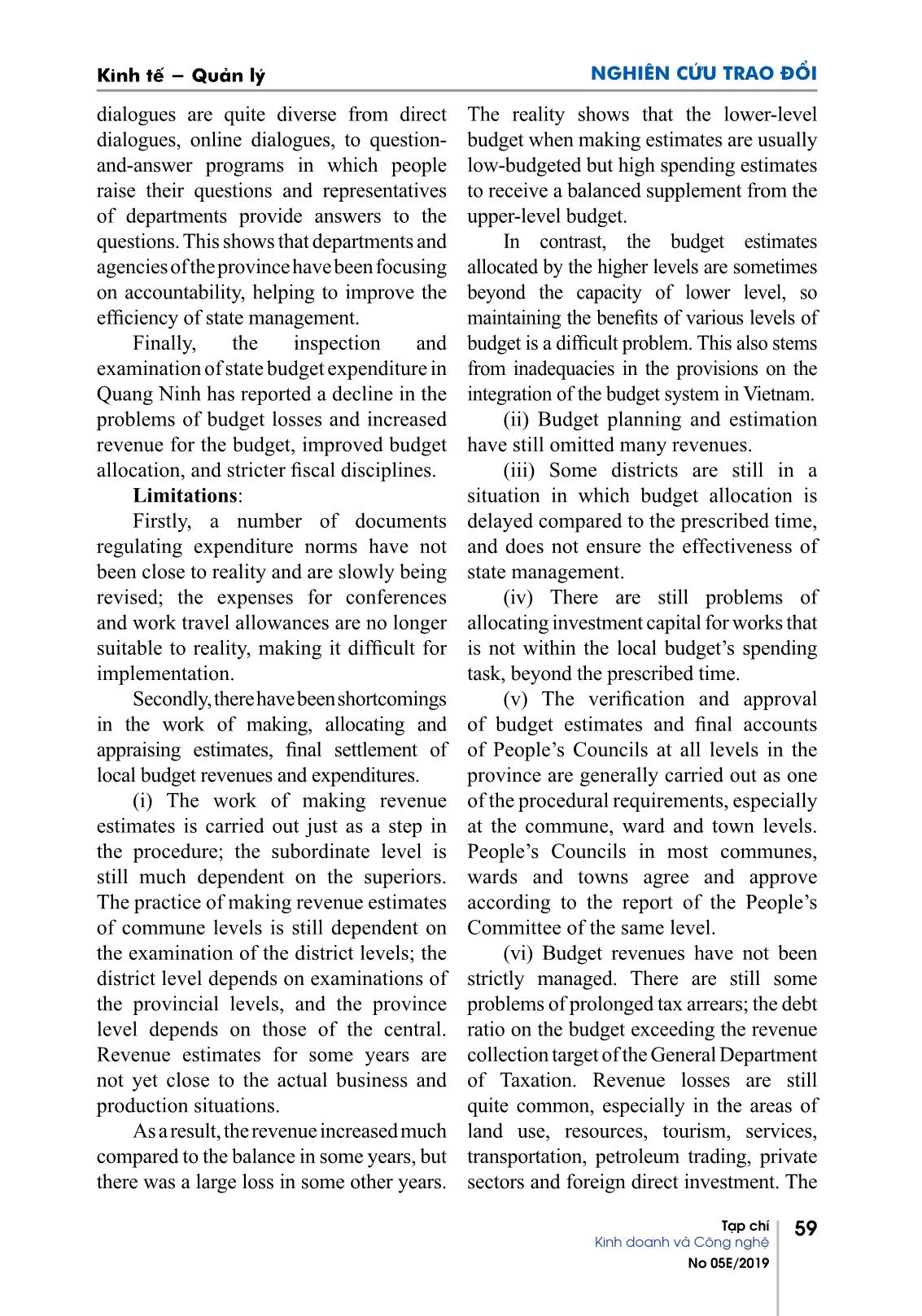
Trang 3
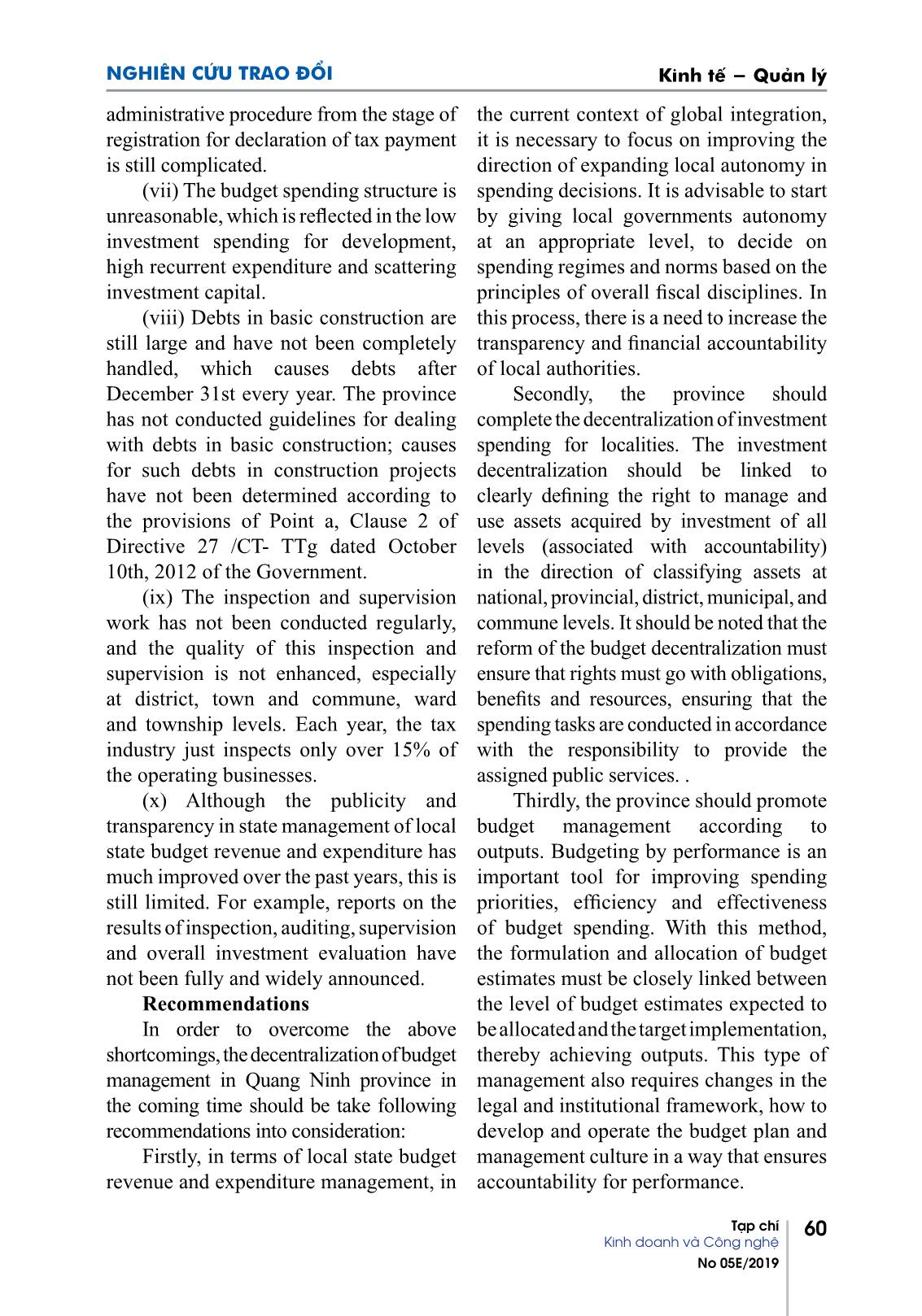
Trang 4
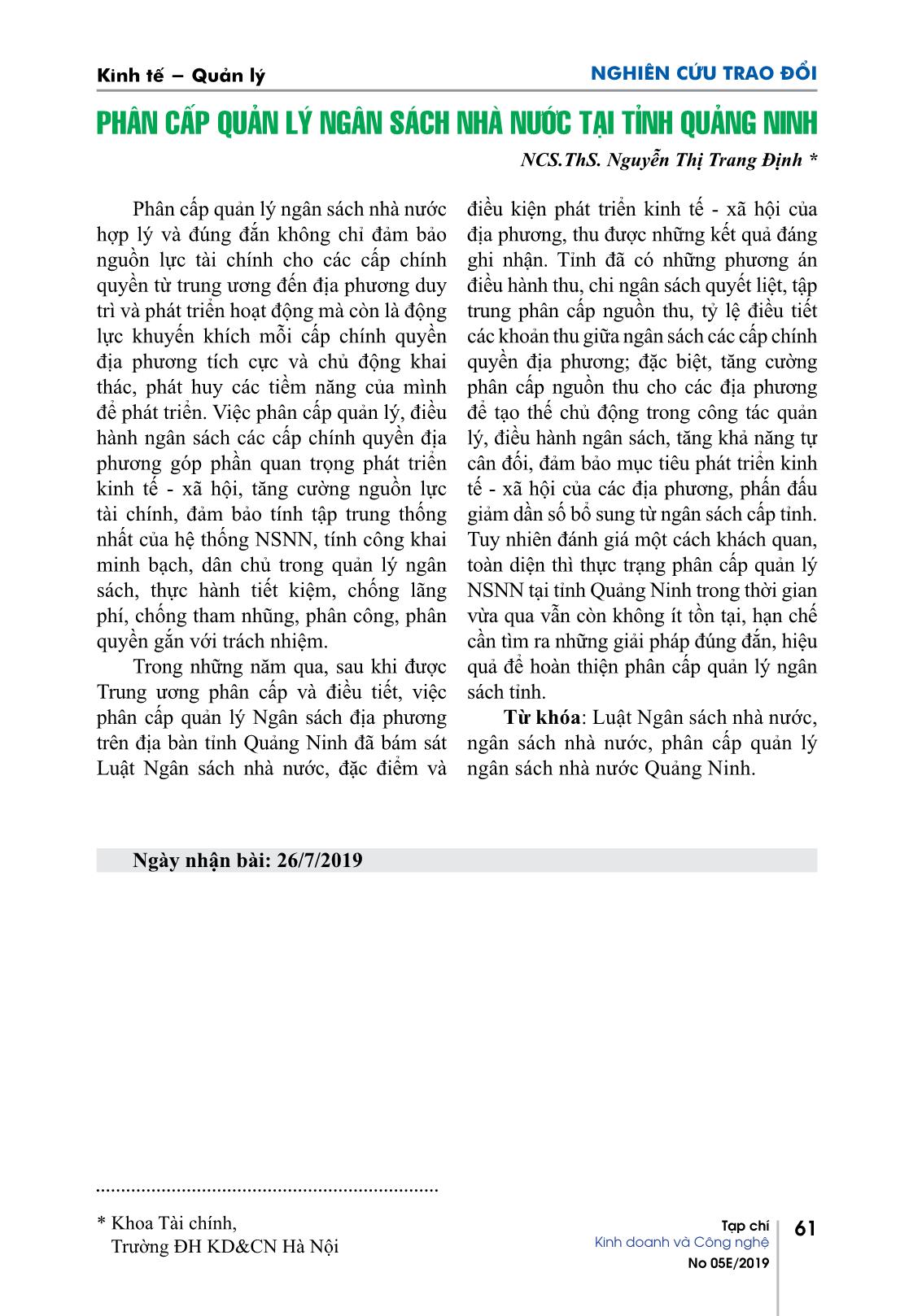
Trang 5
Tóm tắt nội dung tài liệu: Decentralization of state budget management in Quang Ninh province
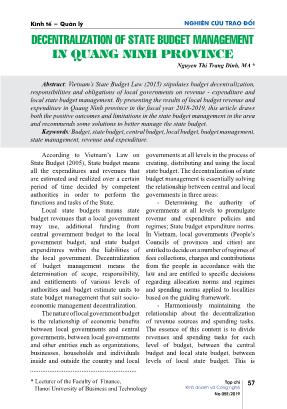
Kinh tế - Quản lý NGHIÊN CỨU TRAO ĐỔI 57Tạp chí Kinh doanh và Công nghệ No 05E/2019 According to Vietnam’s Law on State Budget (2005), State budget means all the expenditures and revenues that are estimated and realized over a certain period of time decided by competent authorities in order to perform the functions and tasks of the State. Local state budgets means state budget revenues that a local government may use, additional funding from central government budget to the local government budget, and state budget expenditures within the liabilities of the local government. Decentralization of budget management means the determination of scope, responsibility, and entitlements of various levels of authorities and budget estimate units to state budget management that suit socio- economic management decentralization. The nature of local government budget is the relationship of economic benefits between local governments and central governments, between local governments and other entities such as organizations, businesses, households and individuals inside and outside the country and local governments at all levels in the process of creating, distributing and using the local state budget. The decentralization of state budget management is essentially solving the relationship between central and local governments in three areas: - Determining the authority of governments at all levels to promulgate revenue and expenditure policies and regimes; State budget expenditure norms. In Vietnam, local governments (People’s Councils of provinces and cities) are entitled to decide on a number of regimes of fees collections, charges and contributions from the people in accordance with the law and are entitled to specific decisions regarding allocation norms and regimes and spending norms applied to localities based on the guiding framework. - Harmoniously maintaining the relationship about the decentralization of revenue sources and spending tasks. The essence of this content is to divide revenues and spending tasks for each level of budget, between the central budget and local state budget, between levels of local state budget. This is DECENTRALIZATION OF STATE BUDGET MANAGEMENT IN QUANG NINH PROVINCE Nguyen Thi Trang Dinh, MA * Abstract: Vietnam’s State Budget Law (2015) stipulates budget decentralization, responsibilities and obligations of local governments on revenue - expenditure and local state budget management. By presenting the results of local budget revenue and expenditure in Quang Ninh province in the fiscal year 2018-2019, this article draws both the positive outcomes and limitations in the state budget management in the area and recommends some solutions to better manage the state budget. Keywords: Budget, state budget, central budget, local budget, budget management, state management, revenue and expenditure. * Lecturer of the Faculty of Finance, Hanoi University of Business and Technology NGHIÊN CỨU TRAO ĐỔI Kinh tế - Quản lý 58Tạp chí Kinh doanh và Công nghệ No 05E/2019 the central content of the state budget management decentralization and it is a difficult and complicated problem. Two issues arise when designing the revenue sharing system: the scope of the shared revenue and the sharing rates. In different countries, the range and rate of division are also different but they all have one thing in common, that is the decentralization of revenue sources and spending tasks must ensure that the central budget plays a leading role to carry out strategic and important spending tasks of the country. At the same time, local state budget is decentralized revenue to ensure proactive implementation of assigned tasks. - Resolving the relationship of duties and entitlements of agencies and authorities at all levels in the state budget cycle. The budget cycle, also known as the budget process, refers to the entire operation of a budget from the beginning of its creation until the end of the transition to the new budget. The budget cycle includes such phases as budget preparation, budgeting, approval, allocation, delivery, compliance, settlement, inspection, examination and budget settlement (collectively referred to as budget preparation, approval and settlement). The level of involvement and control by the authorities, the State administrative agencies, and specialized agencies at all levels of budget is the nature of decentralization in the whole system. The review of the state management decentralization in Quang Ninh shows that the current decentralization mechanism has the following achievements and limitations: Achievements: Firstly, economic activities of Quang Ninh are maintained and developed stably with suitable GDP growth. The revenue of the following year is higher than the previous year, meeting the needs of socio- economic development of the province. The local economy has increasingly integrated into the world economy. The province has carried out its economic restructuring in a positive direction, focusing more on the development of service industry. Many social issues have initially been resolved, which is reflected through the increasing employment; the decline in unemployment rate in urban areas and the rises in income per capita. In addition, the poverty rate has been continuously decreasing over the years. The gap between the rich and the poor in the province has been narrowed compared to that of other provinces and cities in the country. Secondly, the issuance of documents on local budget revenues and expenditures and state management with regard to local government revenues and expenditures has specified the central regulations, meeting the orientations and plans in local state budget management. This provides favorable conditions for management agencies as well as creates the ground for implementing tasks. Thirdly, the management and administration of local state budget revenues and expenditures have basically been implemented in accordance with the provisions of the State Budget Law, the Tax Administration Law, the Investment Law and the guiding documents of the Central as well as local governments, exploiting revenue sources, meeting local demands and sate budget spending tasks. Fourthly, the accountability of the heads of state agencies has been improved, which is reflected in the dialogues between the provincial leaders, the cities, the districts and the provincial governments with enterprises and the public. The Kinh tế - Quản lý NGHIÊN CỨU TRAO ĐỔI 59Tạp chí Kinh doanh và Công nghệ No 05E/2019 dialogues are quite diverse from direct dialogues, online dialogues, to question- and-answer programs in which people raise their questions and representatives of departments provide answers to the questions. This shows that departments and agencies of the province have been focusing on accountability, helping to improve the efficiency of state management. Finally, the inspection and examination of state budget expenditure in Quang Ninh has reported a decline in the problems of budget losses and increased revenue for the budget, improved budget allocation, and stricter fiscal disciplines. Limitations: Firstly, a number of documents regulating expenditure norms have not been close to reality and are slowly being revised; the expenses for conferences and work travel allowances are no longer suitable to reality, making it difficult for implementation. Secondly, there have been shortcomings in the work of making, allocating and appraising estimates, final settlement of local budget revenues and expenditures. (i) The work of making revenue estimates is carried out just as a step in the procedure; the subordinate level is still much dependent on the superiors. The practice of making revenue estimates of commune levels is still dependent on the examination of the district levels; the district level depends on examinations of the provincial levels, and the province level depends on those of the central. Revenue estimates for some years are not yet close to the actual business and production situations. As a result, the revenue increased much compared to the balance in some years, but there was a large loss in some other years. The reality shows that the lower-level budget when making estimates are usually low-budgeted but high spending estimates to receive a balanced supplement from the upper-level budget. In contrast, the budget estimates allocated by the higher levels are sometimes beyond the capacity of lower level, so maintaining the benefits of various levels of budget is a difficult problem. This also stems from inadequacies in the provisions on the integration of the budget system in Vietnam. (ii) Budget planning and estimation have still omitted many revenues. (iii) Some districts are still in a situation in which budget allocation is delayed compared to the prescribed time, and does not ensure the effectiveness of state management. (iv) There are still problems of allocating investment capital for works that is not within the local budget’s spending task, beyond the prescribed time. (v) The verification and approval of budget estimates and final accounts of People’s Councils at all levels in the province are generally carried out as one of the procedural requirements, especially at the commune, ward and town levels. People’s Councils in most communes, wards and towns agree and approve according to the report of the People’s Committee of the same level. (vi) Budget revenues have not been strictly managed. There are still some problems of prolonged tax arrears; the debt ratio on the budget exceeding the revenue collection target of the General Department of Taxation. Revenue losses are still quite common, especially in the areas of land use, resources, tourism, services, transportation, petroleum trading, private sectors and foreign direct investment. The NGHIÊN CỨU TRAO ĐỔI Kinh tế - Quản lý 60Tạp chí Kinh doanh và Công nghệ No 05E/2019 administrative procedure from the stage of registration for declaration of tax payment is still complicated. (vii) The budget spending structure is unreasonable, which is reflected in the low investment spending for development, high recurrent expenditure and scattering investment capital. (viii) Debts in basic construction are still large and have not been completely handled, which causes debts after December 31st every year. The province has not conducted guidelines for dealing with debts in basic construction; causes for such debts in construction projects have not been determined according to the provisions of Point a, Clause 2 of Directive 27 /CT- TTg dated October 10th, 2012 of the Government. (ix) The inspection and supervision work has not been conducted regularly, and the quality of this inspection and supervision is not enhanced, especially at district, town and commune, ward and township levels. Each year, the tax industry just inspects only over 15% of the operating businesses. (x) Although the publicity and transparency in state management of local state budget revenue and expenditure has much improved over the past years, this is still limited. For example, reports on the results of inspection, auditing, supervision and overall investment evaluation have not been fully and widely announced. Recommendations In order to overcome the above shortcomings, the decentralization of budget management in Quang Ninh province in the coming time should be take following recommendations into consideration: Firstly, in terms of local state budget revenue and expenditure management, in the current context of global integration, it is necessary to focus on improving the direction of expanding local autonomy in spending decisions. It is advisable to start by giving local governments autonomy at an appropriate level, to decide on spending regimes and norms based on the principles of overall fiscal disciplines. In this process, there is a need to increase the transparency and financial accountability of local authorities. Secondly, the province should complete the decentralization of investment spending for localities. The investment decentralization should be linked to clearly defining the right to manage and use assets acquired by investment of all levels (associated with accountability) in the direction of classifying assets at national, provincial, district, municipal, and commune levels. It should be noted that the reform of the budget decentralization must ensure that rights must go with obligations, benefits and resources, ensuring that the spending tasks are conducted in accordance with the responsibility to provide the assigned public services. . Thirdly, the province should promote budget management according to outputs. Budgeting by performance is an important tool for improving spending priorities, efficiency and effectiveness of budget spending. With this method, the formulation and allocation of budget estimates must be closely linked between the level of budget estimates expected to be allocated and the target implementation, thereby achieving outputs. This type of management also requires changes in the legal and institutional framework, how to develop and operate the budget plan and management culture in a way that ensures accountability for performance. Kinh tế - Quản lý NGHIÊN CỨU TRAO ĐỔI 61Tạp chí Kinh doanh và Công nghệ No 05E/2019 PHÂN CẤP QUẢN LÝ NGÂN SÁCH NHÀ NƯỚC TẠI TỈNH QUẢNG NINH NCS.ThS. Nguyễn Thị Trang Định * * Khoa Tài chính, Trường ĐH KD&CN Hà Nội Ngày nhận bài: 26/7/2019 Phân cấp quản lý ngân sách nhà nước hợp lý và đúng đắn không chỉ đảm bảo nguồn lực tài chính cho các cấp chính quyền từ trung ương đến địa phương duy trì và phát triển hoạt động mà còn là động lực khuyến khích mỗi cấp chính quyền địa phương tích cực và chủ động khai thác, phát huy các tiềm năng của mình để phát triển. Việc phân cấp quản lý, điều hành ngân sách các cấp chính quyền địa phương góp phần quan trọng phát triển kinh tế - xã hội, tăng cường nguồn lực tài chính, đảm bảo tính tập trung thống nhất của hệ thống NSNN, tính công khai minh bạch, dân chủ trong quản lý ngân sách, thực hành tiết kiệm, chống lãng phí, chống tham nhũng, phân công, phân quyền gắn với trách nhiệm. Trong những năm qua, sau khi được Trung ương phân cấp và điều tiết, việc phân cấp quản lý Ngân sách địa phương trên địa bàn tỉnh Quảng Ninh đã bám sát Luật Ngân sách nhà nước, đặc điểm và điều kiện phát triển kinh tế - xã hội của địa phương, thu được những kết quả đáng ghi nhận. Tỉnh đã có những phương án điều hành thu, chi ngân sách quyết liệt, tập trung phân cấp nguồn thu, tỷ lệ điều tiết các khoản thu giữa ngân sách các cấp chính quyền địa phương; đặc biệt, tăng cường phân cấp nguồn thu cho các địa phương để tạo thế chủ động trong công tác quản lý, điều hành ngân sách, tăng khả năng tự cân đối, đảm bảo mục tiêu phát triển kinh tế - xã hội của các địa phương, phấn đấu giảm dần số bổ sung từ ngân sách cấp tỉnh. Tuy nhiên đánh giá một cách khách quan, toàn diện thì thực trạng phân cấp quản lý NSNN tại tỉnh Quảng Ninh trong thời gian vừa qua vẫn còn không ít tồn tại, hạn chế cần tìm ra những giải pháp đúng đắn, hiệu quả để hoàn thiện phân cấp quản lý ngân sách tỉnh. Từ khóa: Luật Ngân sách nhà nước, ngân sách nhà nước, phân cấp quản lý ngân sách nhà nước Quảng Ninh.
File đính kèm:
 decentralization_of_state_budget_management_in_quang_ninh_pr.pdf
decentralization_of_state_budget_management_in_quang_ninh_pr.pdf

